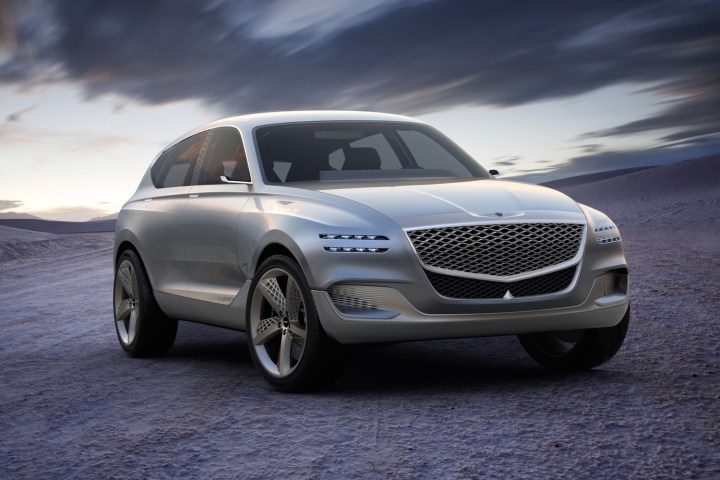
Hyundai launched its Genesis luxury brand with a lineup of well-executed sedans, but buyer tastes have since shifted to SUVs. So it was only a matter of time before Genesis added some of those vehicles to its lineup. That will happen sooner rather than later, according to Motor Trend. The magazine reports that Genesis will launch its first SUV in 2020.
The first SUV will borrow styling cues from the Genesis GV80 concept. It was widely assumed that the GV80 would preview a future production model when it debuted at the 2017 New York Auto Show, so this doesn’t comes as much of a surprise. The production model could appear at the 2019 Los Angeles Auto Show in November, reports Motor Trend, ahead of its arrival in showrooms in 2020. The SUV, which will likely retain the GV80 name, will compete with the Audi Q7, BMW X5, and Mercedes-Benz GLE.
The GV80 concept had a hydrogen fuel-cell powertrain, but that likely won’t transition to production. While Genesis parent Hyundai currently sells the Nexo fuel-cell SUV, the production GV80 will launch with a range of conventional gasoline powertrains, according to Motor Trend. Hyundai’s familiar 3.8-liter V6 and 3.3-liter twin-turbocharged V6 are likely contenders, the magazine reports.
The second Genesis SUV will reportedly be a smaller model named GV70. It will launch in 2021, Motor Trend reports, but no other details have surfaced. As a smaller counterpart to the GV80, the GV70 will take on the Audi Q5, BMW X3, and Mercedes-Benz GLC.
Genesis is also working to get two radical concept cars into production. The all-electric Essentia coupe could enter production, Genesis brand boss Manfred Fitzgerald said in an interview with Motor Trend. Fitzgerald said “it’s just a matter of getting the powertrain equation right.” The Mint city car concept could also make it to production, Fitzgerald said. Instead of the typical small hatchback the Mint features a sleek design with vertically opening doors. It looked great on the 2019 New York Auto Show floor, but seemed like it would be difficult to adapt to the real world.
Finally, Genesis is giving its flagship G90 sedan an update. The new version, which features revised styling and an updated infotainment system based around a 12.3-inch touchscreen, has already been unveiled in South Korea. It will arrive in the United States this fall, according to Motor Trend.


